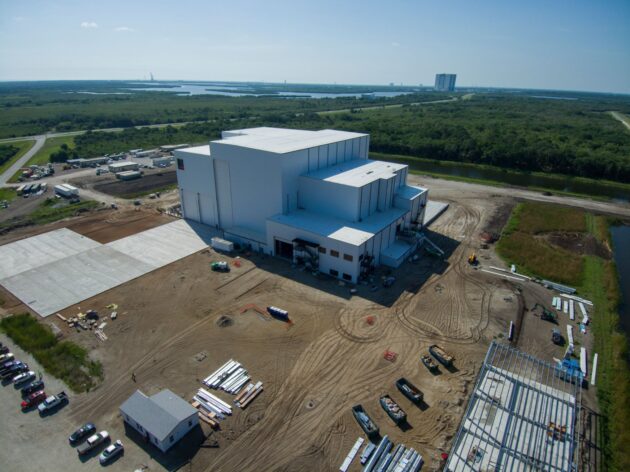Amazon’s Project Kuiper is expanding with the construction of a secondary support facility at Kennedy Space Center in Florida. The $19.5 million expansion plan brings the total investment in the site to nearly $140 million. The new 42,000-square-foot building will be located next to the existing 100,000-square-foot structure at the satellite processing facility, providing additional space for processing and storing flight hardware for the deployment of Project Kuiper’s 3,232-satellite constellation. Project Kuiper is Amazon’s ambitious project to provide broadband internet service globally using satellites in low Earth orbit, positioning it as a competitor to SpaceX’s Starlink network.
Both Amazon and SpaceX manufacture their satellites in the Seattle area, with Starlink’s factory in Redmond, Wash., and Project Kuiper’s facilities in Redmond and nearby Kirkland. Amazon has launched two prototype satellites so far, and most of Project Kuiper’s satellites are expected to be launched from Florida on rockets provided by United Launch Alliance, SpaceX, and Blue Origin in the coming years. The newly announced satellite facility in Florida is expected to streamline the process of receiving shipments, connecting satellites to custom dispensers, integrating the loaded dispensers with launch vehicles, and feature various capabilities such as temperature-controlled storage areas, maintenance bays, and multipurpose workspaces.
Amazon’s investment in Project Kuiper’s infrastructure at Space Florida’s Launch and Landing Facility not only underlines its commitment to delivering reliable broadband connectivity to underserved communities worldwide, but also strengthens Florida’s position as a hub for space innovation and job creation. The company also plans to invest in infrastructure and service upgrades at Cape Canaveral as part of its launch agreement with United Launch Alliance. Construction is underway on a second ULA vertical integration facility dedicated to Project Kuiper, with completion expected in early 2025. Project Kuiper remains on track to begin delivering service to customers in 2025, with more than 2,000 people at Amazon currently working on the program.
The expansion of Project Kuiper’s satellite processing center in Florida is a significant step towards achieving Amazon’s goal of providing broadband internet service on a global scale. The new support facility will enhance the processing and storage capabilities required for launching Project Kuiper’s satellite constellation into low Earth orbit. With the increasing demand for internet connectivity worldwide, Project Kuiper aims to address the needs of underserved communities and potentially compete with existing satellite internet providers like SpaceX’s Starlink network.
The strategic location of the satellite processing facility at Kennedy Space Center in Florida will facilitate the deployment of Project Kuiper’s satellites using rockets from various providers, including United Launch Alliance, SpaceX, and Blue Origin. The state-of-the-art infrastructure being developed at the facility, such as temperature-controlled storage areas and maintenance bays, will enable efficient handling of satellite hardware and streamline the integration process with launch vehicles. Amazon’s investment in space innovation not only benefits Project Kuiper but also contributes to Florida’s growing reputation as a center for cutting-edge space technology and economic growth.
With Amazon’s continued commitment to expanding Project Kuiper’s capabilities and infrastructure, the company is positioning itself as a major player in the satellite internet industry. The planned investments in Florida’s space facilities and the establishment of new support structures underscore Amazon’s dedication to bringing high-speed internet access to remote and underserved regions across the globe. By leveraging state-of-the-art technology and strategic partnerships with launch providers, Project Kuiper is poised to revolutionize the way internet connectivity is delivered, ultimately making a significant impact on global communication networks and fostering technological innovation in the space industry.











